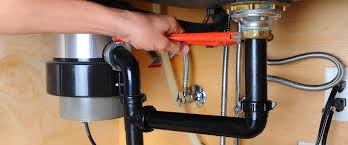Garburators, or garbage disposals, are essential appliances in modern kitchens, helping you dispose of food waste quickly and efficiently. However, like any appliance, garburators can face issues that hinder their performance. Understanding the common problems and knowing when to seek professional repair can save you time and money.
Why Your Garburator Needs Repair
Garburators experience wear and tear over time due to constant use. Regular maintenance and repairs can ensure that your garbage disposal works properly, avoiding unpleasant odors and potential clogs.
Common Issues with Garburators and How to Fix Them
Garburators are prone to a variety of issues, ranging from simple blockages to more complex motor malfunctions. Knowing the signs and when to repair your appliance can help prevent more severe damage.
- Clogs and Blockages
Food debris and waste can sometimes cause blockages in the disposal unit, leading to slower drainage or complete backups. Using proper waste disposal practices and regular maintenance can prevent this issue. - Jammed Motor
The motor in the garburator can become jammed if too many solid objects are placed inside. Items like bones, fibrous vegetables, and grease can obstruct the motor, requiring professional intervention. - Unusual Noises
Grinding or rattling sounds can indicate a problem with the disposal’s internal parts, such as loose components or something caught in the blades. These noises should be addressed quickly to avoid further damage. - Leaks and Water Damage
Leaks can occur around the seals or connections, potentially damaging the surrounding plumbing and cabinetry. Leaks should be fixed immediately to prevent water damage to your kitchen.
How to Maintain Your Garburator
Preventive maintenance can go a long way in extending the life of your garburator repair. Regular cleaning and proper waste disposal habits are essential for keeping your unit functioning efficiently.
- Run Water During Use
Always run cold water when operating your garburator to help flush food particles down the drain. Avoid running hot water as it can melt grease and cause blockages further down the drain. - Avoid Hard or Non-Disposal Items
Do not place bones, large food scraps, fibrous vegetables, or grease into your garburator, as these items can cause jams or clog the unit. - Use Natural Cleaners
Clean your garburator regularly using natural cleaners like baking soda and vinegar. This will help eliminate odors and reduce grease buildup. - Inspect for Leaks
Check the seals around your garburator regularly to ensure there are no leaks. Promptly fixing any leaks will help prevent water damage to your kitchen.
When to Call a Professional for Garburator Repair
While some garburator issues can be fixed at home, others may require the expertise of a professional. Knowing when to call a technician can help you avoid unnecessary damage and expensive repairs.
- Persistent Clogs or Jams
If you cannot clear a clog or jam after trying basic troubleshooting methods, it may be time to call a repair professional. Persistent issues often indicate deeper problems that require specialized tools and expertise. - Burning Smell or Overheating
A burning smell or an overheated garburator motor may indicate a malfunction or electrical problem. These types of issues should be addressed by a qualified technician to avoid further damage or electrical hazards. - Leaking Connections
If you notice water leaking around the garburator’s connections, it is best to have a professional inspect and repair the unit to prevent water damage to your kitchen. - Repeatedly Tripped Circuit Breakers
If your garburator’s circuit breaker keeps tripping, it may signal an underlying electrical issue. This could indicate problems with the motor or electrical wiring that should be addressed by a certified technician.
Frequently Asked Questions
How often should I have my garburator serviced?
It’s recommended to have your garburator serviced annually to ensure it’s in good working condition. Regular inspections can help prevent issues and extend the lifespan of the unit.
Can I repair my garburator myself?
Simple issues, such as clearing a jam or unclogging the disposal, can be done safely at home. However, electrical or motor-related problems should be left to a professional technician.
Why is my garburator making a loud noise?
Loud noises usually indicate something is stuck in the blades or there is an issue with the motor. Turn off the power, check for any obstructions, and remove them carefully. If the noise persists, contact a professional for repair.
How do I prevent my garburator from clogging?
Avoid putting large food scraps, bones, grease, or fibrous vegetables down the garburator. Regularly run water during use and clean the unit to ensure smooth operation.
Final Thoughts
Garburators are an invaluable appliance in the kitchen, helping you manage food waste efficiently. However, regular maintenance and prompt repairs are key to keeping them running smoothly. Understanding common issues, how to maintain your unit, and when to call for professional help can save you time, money, and frustration. If your garburator needs repair, don’t hesitate to reach out to an experienced professional who can restore it to peak performance.


